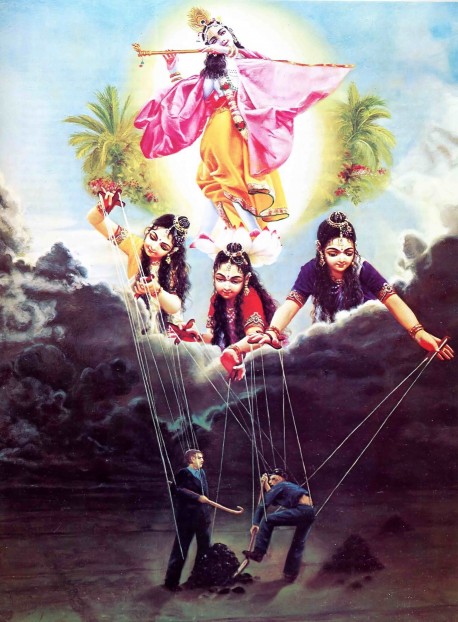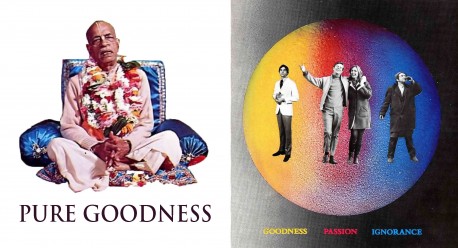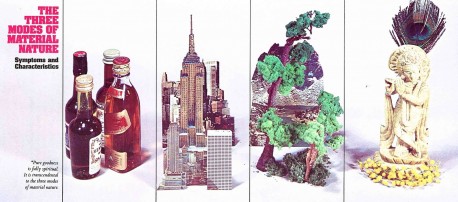by Vishakha-devi dasi
Why are some people by nature outgoing and talkative while others are quiet and shy? What are the forces of nature that compel people to act the way they do? How do these forces work, and who is controlling them?
Dr. and Mrs. A. B. Bright and their two children have a small home, just suitable to their needs, in a peaceful country town. Dr. Bright is the local, M.D., a thoughtful, qualified man, respected for doing his job honestly and selflessly. His hobby: reading books of philosophy, poetry and science. Mrs. Bright and the children (the children aren’t in school) farm and garden around the house and care for the family cow. The Brights are mildly prosperous people who give thanks to God for the things they have and take their religion as a serious duty. By almost anyone’s standards, they’d have to be considered exceptionally pious. They don’t gamble, and for them intoxicants are strictly taboo—they don’t smoke, and not to speak of liquor, they don’t even drink coffee or tea. Dr. Bright has seen too many of his patients bring trouble to themselves through extramarital affairs, so he’s always been faithful to his wife; and she, too, has always been faithful to him. The Brights decided long ago that killing animals is barbaric, so they never eat meat, fish, chicken or even eggs. All in all, the Brights lead a clean, simple and happy life. But the Brights are conditioned by a sense of happiness and knowledge. They are attached to their harmonious world. Therefore they are bound to the mode of goodness.
The Smiths, by contrast, live in suburbia in a stylish home filled with modern conveniences. Each morning Larry Smith gulps down breakfast in time to fight traffic to the office. There he sits all day dealing with different “headaches,” as he calls them. A hard job, but worth it, he figures, since it lets him afford the luxuries he enjoys and still have some money left over for the stock market and some rather shady business schemes he has going on the side. (“Money is the honey,” Larry says.) Gloria, his wife, wakes up in time to see that the two older children look decent (family prestige is important to the Smiths) and sends them off to school. She spends most of her day with the baby (“the one we didn’t expect,” says Larry). Either Gloria’s in the house with the TV going, in the playground with the other housewives and children, in the beauty salon, or (sometimes it seems like forever) shopping. All day the Smiths are active, on the go. At night they relax, but sometimes their minds are just so wound up that they can’t get a good night’s sleep. They squabble with each other, and sometimes they’re depressed, but as Larry jokingly philosophizes, “There’s no problem so great that sex can’t solve it.” On the weekends the Smiths make a show of being religious, but it’s more or less a social affair, since in fact they generally disregard the guidelines of their scriptures. This family is typical of the mode of passion.
The mode of ignorance is exemplified by the lives of John Dull and Betty Grumble. They never got married, but they live together, in squalor, in a cheap apartment in New York City. Welfare checks cover part of the rent, and at the end of the month John gets together the rest by peddling drugs. Religion, they both decided long ago, is something they want no part of. They spend their time sleeping (at least ten or twelve hours a day) or else getting high on drugs, feasting on beer and salami, and languishing in their apartment. For years they’ve dreamed about starting a commune in Spain, or perhaps Madagascar or Nepal.
What are these forces called “modes”? The modes of nature—goodness, passion and ignorance—are aspects of Krishna’s inferior energy. Lord Krishna, the Supreme Personality of Godhead, has innumerable energies. For our understanding, however, they have been classified in three groups: the inferior energy, which is material; the superior energy, which is spiritual; and the marginal energy—we ourselves, the living entities. We are called marginal because we may come under the influence of either the superior or the inferior energy. For example, our body is Krishna’s inferior energy. That means that by nature it is temporary and is a source of ignorance and misery. If one identifies with the body or mind—if one thinks that he’s an American or Indian, that he’s fat or thin, healthy or sick, Hindu or Catholic, democratic or communistic, and so on—he then comes under the influence of the inferior energy and its material qualities. Thus one is impelled to act by the modes or qualities of material nature—goodness, passion and ignorance. If we remember, however, that the life force—the source of consciousness within the body—is different from the body itself, and if we act in that remembrance, then we can free ourselves from the influence of the material energy.
The conscious spark that gives life to the body is a tiny particle of the spiritual energy of the Supreme Lord, and so it has an eternal relationship with the Lord. When we act according to that relationship, which is one of service to the Lord, then we are acting naturally, spiritually. Thus we are completely liberated from the modes of material nature, and we revive our natural spiritual qualities of eternity, knowledge and bliss.
We generally think that we’re in control of our actions and that we’re making our own decisions, but the supreme authority, Krishna, declares that this is not the case. He says that we are acting as puppets—victims—of the forces of nature. In Bhagavad-gita Lord Krishna says, “All men are forced to act helplessly according to the impulses born of the modes of material nature; therefore no one can refrain from doing something, not even for a moment.” (Bg. 3.5) Not just you and I, but “no being existing, anywhere in the material world, is free from the three modes of material nature.” (Bg. 18.40)
To return to our earlier example, Dr. Bright, our learned physician, feels advanced in knowledge and materially happy in his peaceful library at home. But although his life may seem pleasant, he’s still in the bodily or material concept of life, and therefore he is in illusion. He thinks that he is Dr. Bright, an American, a middle-aged man, a husband, a father, a reasonable, well-educated country gentleman. But these designations are all material; they concern only the body and mind. Dr. Bright has not yet realized that he is neither his body nor his mind; he is a spiritual soul, an eternal servant of Krishna. Since he misidentifies himself with his body, he must come under the influence of the laws of nature governing that body. So he must continue suffering the bodily problems of birth, old age, disease and death.
If one in the mode of goodness is bound in this way, what to speak of those in the lower modes? Those in passion, like the Smiths, are bound by their attempts to satisfy their uncontrollable hankerings and longings. And those in ignorance, like Mr. Dull and Miss Grumble, are bound by madness, indolence and sleep.
Our real life, as we mentioned, is spiritual, and so it is eternal, blissful and full of knowledge. Under the illusion of goodness, however, we look for this reality in mundane learning and a feeling of material satisfaction. In passion we seek it in sex and possessions; and in ignorance we seek it in sleep and intoxication. Thus our pure spiritual nature is perverted by impure desires, born of the modes of nature.
When Bright, Smith, Dull and Grumble were born, they had no control over when or where they’d take birth, what kinds of bodies they’d be given or who their parents would be. Somehow or other, nature put each of them, helpless, into his own predicament. Now they think that they’re controlling their fate, but actually their helplessness has not changed. They are still acting according to the bodies that a higher authority has given them. They are neither the proprietors nor the controllers of the actions and reactions of those bodies. They are simply drowning in the midst of a material ocean, being tossed by the waves of that ocean and struggling for existence. Therefore Krishna says in Bhagavad-gita, “One who can see that all activities are performed by the body, which is created of material nature, and sees that the self, the soul within, does nothing, actually sees.” (Bg. 13.30)

At this point we can hear ourselves protesting: “I have control over what I do. I can choose whether to go to the bar or the opera, whether to marry a prostitute or a Radcliffe girl. Nothing is forcing me to act.”
Yes, we have minute independence. Krishna is svarat, or completely independent; God can do whatever He likes. And since we are tiny parts of God, we also have His quality of independence—but only in a minute quantity, proportionate to our size. Therefore, according to our desires, our body acts either in goodness, passion, ignorance or some combination. But whatever these desires are, they are material. They spring from our bodily concept of life, and therefore they are products of the modes of nature. And the ways we try to fulfill these desires are also material. Thus we are revolving in Krishna’s inferior, material energy. “Sometimes the mode of passion becomes prominent,” Lord Krishna says, “defeating the mode of goodness. And sometimes the mode of goodness defeats passion, and at other times the mode of ignorance defeats goodness and passion. In this way there is always competition for supremacy.” (Bg. 14.10) Just as the basic colors yellow, red and blue mix in different ways to produce an uncountable variety of tints and hues, so goodness, passion and ignorance mix together to produce innumerable illusions in our minds, This explains why the Brights sometimes quarrel over trivial problems; why the Smiths, and even Dull and Grumble, sometimes unexpectedly give to a bona fide religious charity; and why the Smiths go partying once in a while, drink too much, and find themselves hungover in bed the next morning, overcome by the mode of ignorance.
Like it or not, we should understand that we are now tightly tied by ropes of illusion. A man bound by the hands and feet cannot free himself; he must be helped by a person who is unbound. Because the bound cannot help the bound, the rescuer must be liberated. Therefore only Krishna, the fully liberated Supreme Lord, or His bona fide representative, the spiritual master, can release the conditioned soul. Without such superior help, one cannot be freed from the bondage of material nature. The only way to get completely free from its clutches is to surrender to the Supreme Person. Lord Krishna therefore says in Bhagavad-gita, “This divine energy of Mine, consisting of the three modes of material nature, is difficult to overcome. But those who have surrendered unto Me can easily cross beyond it.” (Bg. 7.14)
The Brights and Smiths, and Dull and Grumble, can become free from the material concept of life simply by receiving bona fide transcendental knowledge. If one has been living in a dark room all his life, he is always floundering, unable to see things as they are. Once the lights are switched on, however, everything becomes apparent, and one can at once act properly. Similarly, with the light of transcendental knowledge we can overcome our bondage and act in accordance with our spiritual nature. Thus we can liberate ourselves from this material world. Krishna therefore says in the Gita, “One who understands this philosophy concerning material nature, the living entity, and the interaction of the modes of nature is sure to attain liberation. He will not take birth here in this material world again, regardless of his present position.” (Bg. 13.24)
Hare Krishna Hare Krishna Krishna Krishna Hare Hare
Hare Rama Hare Rama Rama Rama Hare Hare

One who is thus becoming freed from illusion and who is scientifically understanding his pure, natural consciousness is sure to become a devotee of the Supreme Lord. In the beginning such potential devotees naturally develop the desirable personal qualities that characterize the mode of goodness. They strictly avoid all sinful activities: they do not eat meat, fish or eggs, they take no intoxicants, and they do not gamble or engage in illicit sex. But, beyond that, they seek out a bona fide spiritual master and then cultivate transcendental knowledge under his guidance. Thus each day they hear scientific information about Krishna from Vedic scriptures like Bhagavad-gita and Srimad-Bhagavatam, and they chant the holy names of God—Hare Krishna, Hare Krishna, Krishna Krishna, Hare Hare/Hare Rama, Hare Rama, Rama Rama, Hare Hare. Chanting this transcendental vibration is recommended in the scriptures as the best way to transcend the three modes of material nature in our difficult age of quarrel and hypocrisy.
A devotee of the Lord is free from bondage to the modes because his mind, body and words act spiritually—that is, in relationship to Krishna. He always serves the pleasure of the Lord. For the sake of the Lord he will do any work needed, and for such work he will live anywhere—whether it be in the country, suburbs or city. Such a Krishna conscious devotee accepts whatever is favorable to the service of Krishna and rejects everything unfavorable to that service. In Bhagavad-gita Krishna says:
mam ca yo ‘vyabhicarena
bhakti-yogena sevate
sa gunan samatityaitan
brahma-bhuyaya kalpate
“One who engages in full devotional service, who does not fall down in any circumstance, at once transcends the modes of material nature and thus comes to the level of spiritual perfection.” (Bg. 14.26)
Thus we can attain spiritual perfection simply by remembering our relationship with Krishna and acting in that relationship. We need not be disturbed by the modes of nature, for instead of putting our consciousness into material activities, we can transfer it to activities centered around Krishna. Such Krishna-centered activities make up bhakti-yoga. When we engage in this topmost yoga system, we acquire the same spiritual qualities as Krishna. The Lord is eternal, blissful and full of knowledge, and we are part of Him, as gold particles are part of a gold mine. Thus our spiritual qualities are similar to those of Krishna. The difference, however, is that Krishna is infinite, whereas the living entities are infinitesimal.
Although the modes of material nature are very difficult to overcome, we can overcome them easily if we have the mercy of the Lord, for the Lord, after all, is the creator and controller of the modes. And how can we attain that mercy?
yasya deve para bhaktir
yatha deve tatha gurau
tasyaite kathita hy arthah
prakasante mahatmanah
“The mercy of the Lord can be obtained only by those surrendered souls who have implicit faith in both the Lord and the spiritual master.” Such fortunate souls can at once become free from the three modes of material nature and regain their original spiritual nature, which is one of boundless transcendental joy in a loving relationship with Krishna, the Supreme Personality of Godhead.”
[Please refer to the PDF file of this BTG issue for a table that gives more information about the 3 modes of material nature]




Leave a Reply